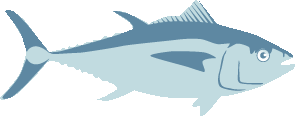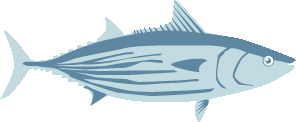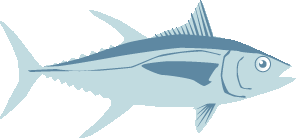Overview
What is a Completed FIP?
Completed FIPs are those that have independent verification that they have achieved their environmental objectives and/or graduated to MSC full assessment or other program assessment. Completed FIPs no longer report on their environmental performance but may choose to voluntarily report on their social performance.
Date of Completion: Aug 2020
Explanation of Completion: This FIP entered MSC full assessment in 2020 and achieved certification in 2021 but it is continuing to report on its social performance.
This FIP encompasses all global tropical tuna stocks of three species: bigeye tuna (Thunnus obesus), skipjack (Katsuwonus pelamis) and yellowfin tuna (Thunnus albacares) for a total of 13 Units of Certification. In the case of this specific sub-FIP for the Atlantic Ocean, we deal with four stocks of tunas: two for skipjack (eastern and western), and one each for bigeye tuna and yellowfin tuna.
Because of the set-up of this webpage, the overarching FIP was broken into four sub-FIPs according to the relevant RFMO (IATTC, ICCAT, IOTC, and WCPFC). The reasoning behind this division is that each RFMO has different scores and actions for the various MSC principles, in particular Principles 1 & 3. Had we grouped all RFMOs we would not have been able to neither present nor track the various activities and timelines in a cohesive, clear and comprehensive manner.
This FIP encompasses all global tropical tuna stocks of three species: bigeye tuna (Thunnus obesus), skipjack (Katsuwonus pelamis) and yellowfin tuna (Thunnus albacares) for a total of 13 Units of Certification.
- Achieve MSC certification for the OPAGAC industrial purse seine tuna fleet in three oceans and four RFMOs, within the next 5 years.
- Unify the industrial purse seine fishery into one MSC unit of certification instead of the misleading current division of free and associated schools.
- Bring together leading industry and environmental partners to work collaboratively towards sustainability of the fishery and ensure fair market access
- Promote the adoption by RFMOs of Harvest Control Rules for stocks of tropical tuna species, including support to the process of Management Strategy Evaluation based on the best science available;
- For stocks not subject to HCR promote, where required, the adoption of robust ad-hoc rebuilding strategies, in line with MSC standards.
- Influence the various RFMOs to adopt an ecosystem approach to fisheries management.
- Assist RFMOs in the adoption of best practices concerning the use of drift fish aggregating devices (dFADs), through provision of information in support of informed scientific advice.
- Drive real changes in the fleet to minimize the impact of the fishery over non-target species and improve survivorship of sensitive species such as turtles, sharks, and any other sensitive bycatch
Note: The Indicator Scores presented in this website are based on the MSC Performance Indicators (PI) for the species in worst shape in the fisheries. This is because of the way this website is set up, as it does not permit entry of PI scores for more than one stock or species. In this case, two species have a yellow ranking (bigeye tuna and yellowfin tuna) but the two stocks of skipjack (Eastern and Western) are in green.
FIP at a Glance
| 11% | 57% | 32% |
This pie chart represents completed environmental actions. Non-completed environmental actions may contain completed sub-tasks that are not illustrated here. For more information on environmental action progress visit the Actions Progress tab.
- Complete
- Incomplete
TraceabilityIUUEcosystemOther



